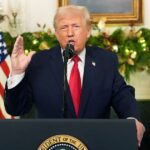

Sen. Marco Rubio (R-FL) took aim at Energy Secretary Jennifer Granholm’s decision to appoint Ford Motor Co.’s top EV lobbyist as a member of her advisory board on Wednesday, noting his role as Ford’s primary defender in its newly announced partnership with Chinese battery supplier CATL.
Rubio, who serves as vice chairman of the Select Intelligence Committee and a senior member of the Senate Foreign Relations Committee, described Christopher Smith’s new position on the Secretary of Energy Advisory Board in a statement as “deeply troubling but unsurprising.”
EL PASO TO VOTE ON ‘CLIMATE CHARTER’ PITTING FOSSIL FUELS AGAINST RENEWABLE ENERGY
“By prioritizing the interests of corporations subservient to the Chinese Communist Party over the interests of hard-working Americans, the administration is once again showing its true colors,” Rubio told the Washington Examiner.
Smith will serve on the board for a two-year term, during which he will retain his current role as Ford’s head of government affairs.
That role has included going to bat to defend Ford’s new partnership with CATL, the Chinese-owned battery maker with which Ford recently announced plans to build a new $3.5 billion EV battery plant in Michigan. The auto giant came under intense scrutiny for its partnership with the China-based company.
Many who have objected to the plan are not assuaged by the unusual design of its equity partnership, which allows Ford to control a 100% ownership stake in the Michigan plant. Some have claimed that, under those terms, Ford can likely still qualify for EV taxpayer subsidies under the Inflation Reduction Act.
Rubio joined Sen. Mark Warner (D-VA) and Gov. Glenn Youngkin (R-VA) in criticizing the Ford-CATL deal and has introduced legislation aimed at prohibiting the company from using taxpayer funds for the venture.
“Without additional restrictions, Chinese companies will benefit from the subsidies President Joe Biden claimed would spur domestic manufacturing,” Rubio said recently.
Smith has praised the plant’s creation as a “big step” in expanding the U.S.’s EV battery industry.
CLICK HERE TO READ MORE FROM THE WASHINGTON EXAMINER
In a recent op-ed, he said the plant will create 2,500 new jobs in Michigan and help fuel more investments in the state.
Smith also disputed claims that the plan is part of China’s Belt and Road Initiative. “That is not true,” he said. “China is not involved in this project. However, Ford’s $3.5 billion investment will help fulfill goals of the U.S. Inflation Reduction Act, including to restore domestic innovation and manufacturing and reduce carbon emissions.”





